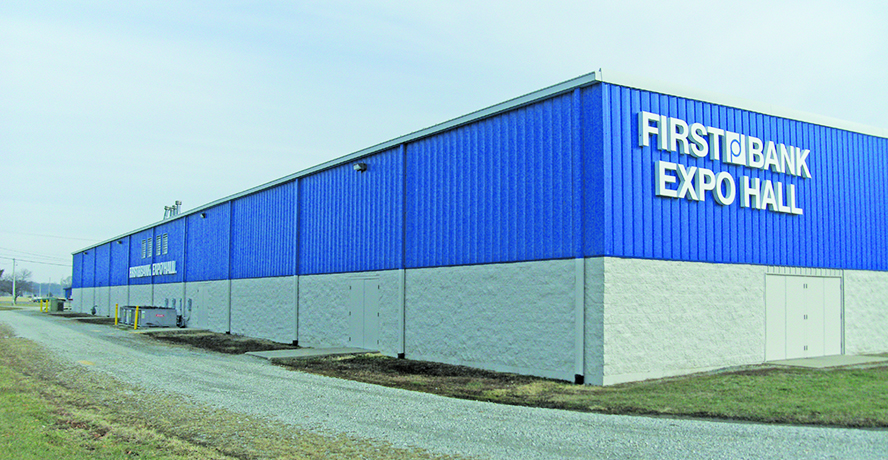Commissioners also review requests for opioid settlement funding
Wayne County Fairgrounds rentals are beginning to rebound after slipping sharply because of the COVID-19 pandemic.
That trend must continue for the fairground’s finances to become self-sustaining, which is the ultimate goal. The fairgrounds drew $136,000 in rental income during 2017; however, it brought in just $89,000 during 2022. Steve Higinbotham, the county’s director of facilities and development, said rentals were returning late in 2022 and look to continue the momentum in 2023.
The Wayne County commissioners discussed Jan. 25 what’s necessary to reach that goal. Jonathan Ferris, the county’s Extension director, and Brad Terhaar, who oversees fairgrounds activities, joined the conversation that Higinbotham facilitated.
Higinbotham said Wayne County is among only a handful of counties where the county government owns and operates the county fairgrounds. He asked if that model is the right way to move forward.
The county is investing in projects to polish the fairgrounds, hoping improved facilities attract more rentals. County investment is supplemented by First Bank Richmond’s $1 million naming rights commitment through 10 years.
Already, the First Bank Kuhlman Center and First Bank Expo Center have undergone exterior repairs and received new blue-and-gray paint schemes. More projects, including HVAC upgrades for both buildings that are expected to cost nearly a half-million dollars and new roofs for Kuhlman and the horse barn that are expected to cost $209,000, are planned.
A sales and marketing coordinator role also has been budgeted for 2023. Last Wednesday’s discussion included deciding what tasks that person, when hired, should address first. Producing promotional materials as well as updating the fairgrounds website were identified as important initial tasks.
Ferris said that Extension personnel can use their networking opportunities and contacts to promote the fairgrounds if they have those materials. The new coordinator would also work closely with county tourism as it also promotes the fairgrounds.
Commissioners additionally identified several other issues to address, such as updating a strategic plan, evaluating staff levels if rentals do increase, updating the rental fee schedule and analyzing the relationship with 4-H.
Currently, 4-H uses fairgrounds facilities without charge, but those programs must defer to paid rentals. This could lead to challenges if facilities are rented more often.
In the end, commissioners opted to have another expanded discussion that includes tourism and the 4-H fair board.
Opioid settlement
Commissioners listened to 18 requests Jan. 24 and 25 for funding from the county’s 2022 opioid settlement money.
A request for applications drew 23 responses asking for $1,244,596. The county received $413,748.19 last year as its share of the national settlement with opioid manufacturer Johnson & Johnson and distributors Cardinal Health, McKesson and Amerisource Berger.
The 18 applicants were asked to provide information beyond what was in their applications. Commissioners sought clarifications about spending plans, partial funding scenarios, and future program sustainability.
All Indiana entities receive funding through 2038; however, the funding drops precipitously after the initial 2022 payments. For example, the county is expected to receive about $75,000 in 2023.
Six of the applicants — Cross Roads, Refuge of Hope, Salt of the Earth, Centerstone, Meridian Health Services and Butterfly House — provide or hope to provide transitional housing for sober individuals returning from treatment or incarceration.
Those applicants alone requested $530,130.
Other projects and programs include connecting people with treatment services and providing them with necessities, education and youth programs, harm reduction efforts and police dogs. Both the Cambridge City and Hagerstown police departments requested $20,000 to fund new K-9s. Neither town received enough settlement money — each in the $12,000 range — to fund the purchases.
Beth Fields, Richmond’s director of strategic initiatives, observed the 10 Jan. 25 presentations. Many of the county applicants involve Richmond.
The county and city plan to meet and discuss their funding pools and priorities.
Fields said the city received $385,313 in 2022 settlement funds. That would make about $750,000 available for distribution from the city and county combined.
The city has not yet decided about requesting proposals for funding, Fields said.
Vehicle purchases
Mike Sharp, the county’s highway superintendent and fleet management committee member, received commissioner permission for the purchase of six vehicles from Wetzel Auto.
The highway department would receive three Ford pickup trucks for $135,786 and equip them with plows from Clark Truck Equipment for $18,402.
Grants would pay for the health department to purchase a Dodge pickup truck for $41,958 and a Ford Escape SUV for $27,920.
The coroner’s office would purchase a pickup truck for $49,358.

